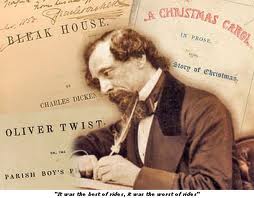Charles Dickens wrote “It was the best of times, it was the worst of times,” the immortal opening sentence to A Tale of Two Cities. Just imagine if he had left behind a typo!
Today, writing truly sees the best of times (we’re free to write whatever we choose, express any thoughts we wish) and the worst of times (too many of us do so without properly revising and proofreading our work before it goes off to print or post.)
I understand very well that anyone can fancy themselves a writer with a few articles published online or with some self-published books. I’ve put out five chapbooks of my own in that same manner. But in each one, quality takes precedence, not only in the ideas I’m expressing, but in the way those ideas are put down in words.

As a freelance professor, I run my red pen across many a run-on & dangling modifier, so I’m used to seeing it in the world of higher education. But more and more I’m watching as those same careless errors worm their way into more professional kinds of writing.
Years ago, I was hired to copyedit a manuscript that was self-published and for sale on Amazon before I got my hands on it. The book was riddled with typos and incongruous sentences, and even whole paragraphs that made no sense at all. I travailed the book in about five or six of the most arduous hours of my career. Another time, a friend of mine sent out a mass email with the first draft of his short script attached. The email was teeming with passion, so naturally I was excited to read the script. However, it was so grammatically marred that I couldn’t even find a loophole into the story itself.
Most recently, an acquaintance I’d met on Facebook asked me if I’d read a script he’d written. I asked him to send me a one-page synopsis and treatment, and my spider sense started tingling. The treatment was littered here and there with careless formatting oversights and some spelling errors that could easily have been remedied by a firm dose of proofreading.
I gave this acquaintance the same advice I offered my friend and the budding young writer: If you want to be taken seriously as a writer, you’ve got to take your writing seriously.
It’s in our nature as creatives to want to exorcise the demons harbored within, give original shapes to the abstractions that wilderness our minds; but like exorcism or architecture, writing is a craft that should be learned and put to practice before sitting down at a laptop to tap out your next litany.
This isn’t some opinion-based issue about whether or not to use the Harvard comma. We’re talking about basic William Zinsser principles on how to write well. I’ve written about writing being serious business in the past because I know firsthand the kind of impression an ill-placed error or half-deleted sentence can leave on a publisher or hiring manager. I once applied for a full-time job as a copyeditor for a DVD distribution company in New York City. I passed all the copyediting and fact-checking tests with ease. On my resume, however, which I’d thrown together in a hurry, there was a single typo that spelled my defeat. This brief stint with carelessness had gotten the better of me. Now, even on rush projects, I exercise patience and strive to make sure that whatever I’m writing is as flawless as possible before I share it with others.
We writers, we’re only human, it’s true. We make mistakes. But we either have to learn to be better than those mistakes by learning from them, or be responsible enough to have someone else proofread our work for us.
So I’ve decided to don my professor’s hat and recommend some helpful books to those of us who may have a harder time than others with this ever-messy matter of English mechanics.
Writing Handbooks:
Pick up anything by Diana Hacker, she’s the pro! Take your pick from my two favorites—A Writer’s Reference or Rules for Writers—or any other handbook that has her name on it.

The Bedford Handbook is also a great resource for writers, as well as the lesser-known Scott Foresman Handbook for Writers.
For a quick reference, I’ve been putting to use a pocket guide called Easy Writer, which I find to be a fantastic resource (plus, it sounds like the movie Easy Rider).
Books on Style:
Of course, first and foremost is the industry standard: William Strunk Jr. & E.B. White’s The Elements of Style.
There’s also a thin sliver of a book concisely packed with sagely insights on how to write with “clarity and grace” simply called Style, by Joseph M. Williams.
A similar book is Style & Difference by Donna Gorrell, which helps to get a writer’s work to stand out from the flock of all the once-in-a-while writers out there.
Grammar Website:
While there’s no such thing as a perfect grammar and spell check system, Grammarly.com comes pretty close.
The bottom line is that we, as writers, need to take the craft of writing seriously, and we have to start from the bottommost rung all the way to where the last one on the ladder ends, because if you can’t take that first step, you’ll have one hell of a time stretching out your ideas toward the stars.
And if you’re not yet sold on the “impotence” of proofreading, here’s a fellow poet and educator whom I look up to saying the same thing (in fewer words). Enjoy!
Thanks for the recommendations. I certainly hope writers pick up one or two and learn from them.
My pleasure. Those books come to my aid more than I’d care to admit. And yes, I hope our “Post-Postmodern Age” writers pick up on it as well! Thanks for the read!